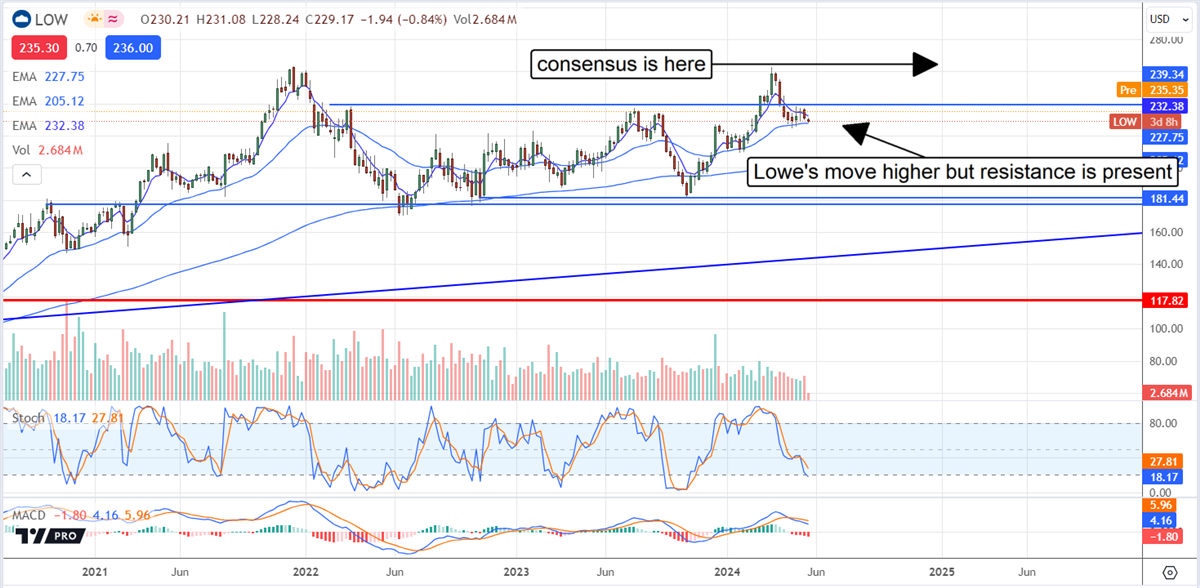![]()
Shares of Lowe’s Companies (NYSE: LOW) corrected to critical support levels ahead of the Q1 release, setting up a buying opportunity confirmed in its aftermath. The results are not strong but highlight the differentiation between the company and its largest competitor, The Home Depot (NYSE: HD), which trails in key spring segments.
Where Home Depot is favored by professional accounts, offering a slimmer selection in a more compact format, Lowe’s excels with choice across critical spring verticals like lawn and garden, outdoor entertaining, and DIY projects. That, along with its leaning into professional services, helped to sustain operations, provide better-than-expected results, and lead management to reaffirm guidance.
"This quarter, we rolled out our new DIY loyalty program nationally, expanded same-day delivery options and took market share in key categories. We continue to gain momentum with our Total Home strategy, reflected in our growth in Pro and online,” said Marvin R. Ellison, Lowe's chairman, president and CEO.
Lowe’s Advances On Results and Guidance
Lowe’s results aren’t fantastic but are much better than feared. The company produced $21.4 billion in revenue for a decline of 4.3% that outperformed the consensus by 150 basis points. The outperformance is good but offset by the fact most analysts lowered their targets within the last 30 days; the bar was set low. The decline is driven by a 4.1% decline in comp sales compounded by lower realized prices in commoditized verticals. Big-ticket DIY items were the primary weakness, offset by professional and online shopping growth.
Margin is also better than feared. The company’s gross and operating margin contracted compared to last year but less than expected. The GAAP $3.06 in diluted earnings is down YOY but a dime better than the consensus reported by Marketbeat.com, suggesting the guidance may be cautious.
The company reiterated its full-year guidance despite the Q1 strength. This means guidance is cautious, or the back half will be softer than expected. However, full-year revenue and earnings guidance align with the consensus estimates and leave room for outperformance. In the long term, the company will likely return to growth by the year's end and accelerate in 2025 as lower interest rates fuel economic activity and housing markets.
Lowe’s Capital Returns Are Safe and Reliable
The only negative aspect of Lowe’s report is the negative shareholder equity, which is not a problem for investors. That situation will be corrected in time because it is a function of share repurchases that significantly reduce the count. The average diluted count is down 2.5% in FQ1 after falling nearly 10% in the prior year’s Q1, and repurchases are likely to continue at a robust pace this year. The company’s business is cash flow positive and allows for repurchases, dividends, reinvestment, and balance sheet improvements. The company uses debt to finance operations but reduces the load over time.
The dividend is worth about 1.9%, with shares near $235, outpacing the S&P 500 average by roughly 50 basis points. The payout is a safe 33% of the earnings and growing. The company is a Dividend King with 60 years of increases to its credit. Future increases may be small but should continue annually for the foreseeable future, aided by share repurchases. Each year, the share count is reduced, freeing up cash flow to increase the dividends for the shares still floated on the market.
Lowe’s Analysts Indicate New Highs Are Possible
Lowe’s analysts’ have the stock pegged at Hold, verging on Moderate Buy with a rising price target. The consensus is 10% above the prerelease price point and up compared to last quarter and year. The Q1 results are not robust but suggest the sentiment will hold firm if the trend in price targets doesn’t continue. Until then, the trend suggests this stock will trade in the upper end of its target range between the consensus $252 and the high target of $289, well above the current all-time high.
The price action is favorable following the release. The market shows support at the critical level and may continue to rebound. The risk is resistance near $240. The market also shows some resistance at this level and may have difficulty moving higher. If the market cannot continue higher soon, it risks moving sideways or falling within the established range until later in the year.






